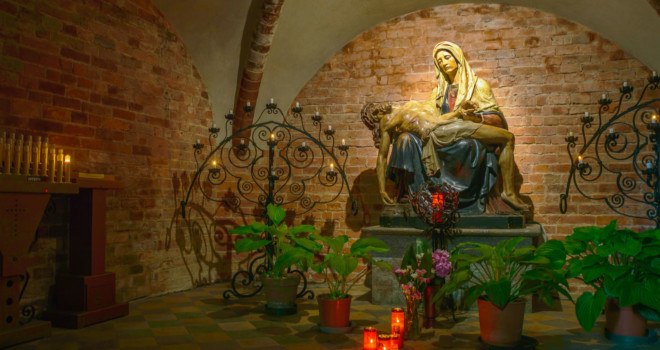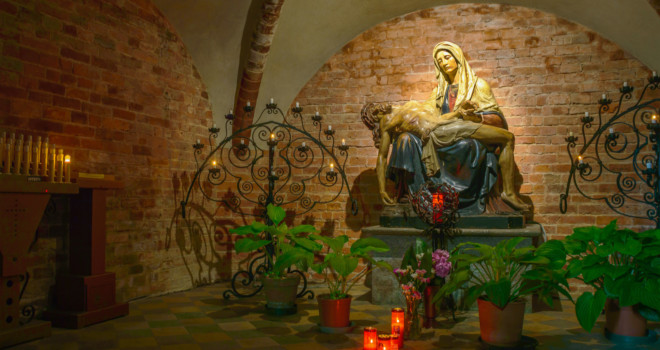We are called to be boldly pro-life in the face of the culture of death. To usher in the Culture of Life in response to our dying culture. As Catholics, we pray and fast in front of abortion clinics. We seek legislation that will undo the evils of abortion. We are repeatedly told the Catholic Church teaches that life begins at conception and must be reverenced from that very first moment. If this is the case—which it is—then why do we as a Church so often ignore the very real agony of miscarriage?
Losing an unborn child to miscarriage is more common than many people realize. The American College of Obstetricians and Gynecologists (ACOG) estimates that miscarriages occur in roughly 25% of all pregnancies. This means that many people sitting in the pews have experienced at least one miscarriage and there are others, like me, who have experienced many miscarriages.
The agony of losing a child is difficult to put into words. Kimberly Cook, author of the book, Motherhood Redeemed: How Radical Feminism Betrayed Maternal Love, shares her experience of miscarriage:
It is no wonder that images like the Pieta and meditations of Jesus’s mother at the foot of the cross affect us so deeply. In experiencing the great suffering of loss through miscarriage, my heart was consumed with an emptiness that seemed impossible to overcome. The love that I had for my child who was not yet born, but whom I carried in my body, was sacred. It was as real as the true hidden presence of Jesus in the tabernacle. Through the loss of that child, my body ached for the pains of pregnancy and the labor that would bring that sweet child into my arms. I longed to smile across the room at her rejoicing father as he held her for the first time.
This is the reality of the mother who grieves the child she never gets to hold on this side of eternity. The loss of a child at any stage of life is one of the most profound agonies that any woman or man can experience in this life. An agony Our Blessed Mother understands more than anyone.
Besides the grief itself, the most difficult aspect of experiencing miscarriages—I have had five—was the silence, indifference, awkward distancing, and lack of spiritual support we received in the wake of each miscarriage. I have never found a body, so there were no funerals. Strangely, there was very little if any spiritual support from the Church outside of occasional spiritual counsel in Confession. We have had to ask for prayers because there has been very little pastoral outreach.
Our pain was met with the administrative and bureaucratic Church that is too busy with everything else to carry the Cross with those who grieve the loss of unborn children. The indifference and/or distancing has been palpable. This from a Church that tells us to defend the unborn, but who ignores the unborn lost by her members.
Miscarriage is also a deeply difficult path to walk in a culture of abortion and contraception. My first few miscarriages were also met with indifference and lack of charity by the medical community. I was repeatedly told that birth control was the only answer to my issues as if that would somehow fix the loss of my children. The medical community has dehumanized the unborn, so this shouldn’t be surprising, but it was still difficult to bear. It took years to find a compassionate doctor who understood the grief of miscarriage.
Expecting the pro-life movement to be better equipped for miscarriage, I quickly discovered this same dehumanizing within that community. Members of the pro-life movement often would say things to me such as: “You can always have another child” or “There was probably something wrong with the baby.” This mentality makes very little sense since we stand outside of Planned Parenthood witnessing to the fact that each human life is made in the image and likeness of God and is unique. Not to mention, our fertility is up to God, not us. There is a very serious contradiction taking place within the Church and the pro-life movement every time we wave away the deep pain of those among us who have lost one or more children to miscarriage.
It was not until my fifth miscarriage that we experienced full spiritual support in our grief. A priest-friend who greatly desires to be a true spiritual father showed us genuine charity and concern. He checked in on us, prayed for us, and much to our great surprise, offered to say a private Mass for our baby’s soul. Something never offered to us before. For the first time, we felt truly seen in our agony and he understood that our family lost an actual child.
He would readily admit that he didn’t know how to respond to the agony of it all since he wasn’t taught anything about it in seminary, but he understood his role as a spiritual father was to reach out to us in our suffering and to provide the spiritual gifts given by God that are meant strengthen us in our time of need and our obligation in charity to pray for the dead, including the unbaptized unborn.
He acknowledged that we are in fact grieving parents standing at the foot of the Cross. He offered us healing through the unbloodied sacrifice of Jesus in the Holy Eucharist for the child we lost, rather than ignoring our grief or offering superficial platitudes. We would never treat a grieving family who lost a born child in the indifferent or superficial manner we treat those grieving miscarriage in the Church today.
The Church’s primary response to the grief of miscarriage should be spiritual. Miscarriage is something that unfortunately is rarely discussed in seminary, and yet, it is a common experience among the spiritual daughters and sons of priests. Understandably, this means that many priests must learn as they go, but the current status quo of ignoring this issue damages parish communities and our witness in the pro-life movement.
Deep down it boils down to the call of priests to love with the heart of a spiritual father united to the Most Sacred Heart through entering into the Cross with his spiritual children. Private Masses, burials (when a body is present), prayers, and pastoral support should be the status quo. The grieving do not know how to navigate such trials, which is why their spiritual fathers must proactively minister to them. Most couples have no idea what to ask for after a miscarriage, which is why we need our priests to offer spiritual goods and pastoral care to them, not wait for the grieving to come to them. A father doesn’t wait to minister to his children, he makes haste in their need.
The answer for the Church in response to miscarriage is to live what we preach. Do we truly believe in the Gospel of Life? Do we truly believe that life begins at conception? If so, then that places demands upon us to truly live that way within the Mystical Body. We cannot continue to ignore the grief of those families who have lost children to miscarriage.
We cannot place other activities and events that are of less importance above the spiritual needs of the suffering among us. Too often we ignore the agonies around us in favor of our own plans. We sweep under the carpet the grief of the people right in front of us. We urge people to sign up for 40 Days for Life, but ignore the silent grief-stricken families sitting next to us in our parishes. It is the suffering and the sick Christ seeks to minister to, but we focus on our own plans. Down through Church history we too often live in great spiritual blindness because we see as human beings do, not as Christ sees.
There are priests and communities who have taken matters into their own hands and begun ministering to those families who have experienced miscarriage. This is a great blessing and sign of progress, but that progress is inconsistent. I experienced miscarriages over the course of 10 years and only experienced deep spiritual support and ministering with my fifth miscarriage. Many friends of mine who have also lost multiple children received very little support from their parish communities and priests.
To add insult to injury, Planned Parenthood recognizes and provides support for women who have experienced a miscarriage—contrary to their philosophy of abortion—but the Catholic Church largely ignores it. If the Church fails to recognize the validity of these losses, how can we expect the pro-choice community to do so?
We must uphold the dignity of every human person from conception to natural death, which means grieving the loss of miscarried children, commending them to God, and treating families who suffer the loss of the unborn with the same dignity as those who lose husbands, spouses, born children, etc. Would we ask one of those families to hide away their grief? If not, why do we do it with great frequency to those who have lost unborn babies to miscarriage? Only by acknowledging the loss of the unborn within our communities will we begin to truly live the Culture of Life in a consistent way that will help bring about conversion in a culture mired in abortion.
✠
image: pieta in church of Asti, Italy / Thoom / Shutterstock












